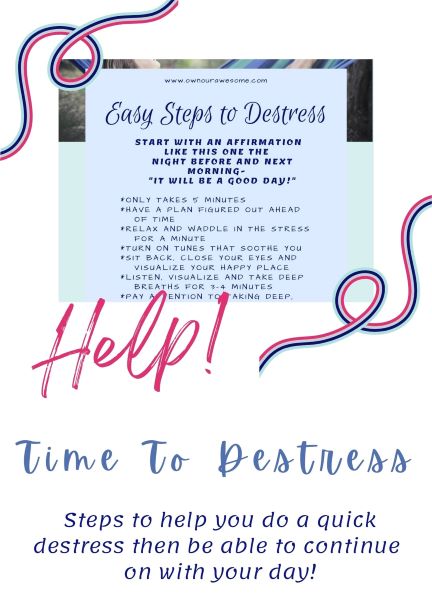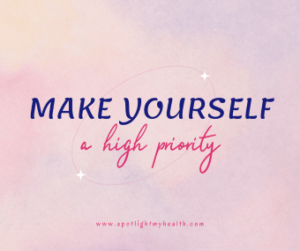Many of us realize that stress affects our health. And while stress affects both sexes, studies are beginning to show that stress could be affecting women more than men. We all go through stress at different times in our lives, but it is when the stress becomes unyielding in your life and becomes chronic, that stress can make you feel crappy emotionally and it can cause some serious health problems.
Think about it—let’s say you are becoming overwhelmed. Laundry is in the washer and dryer, one kid wants to go somewhere, while the baby is crying to eat, and the dog is running around the house and barking—not overwhelming at all is it. But when you are in the situation, your heart beats faster, a tension headache may start or your tummy may start to churn in time with the kids and the dog.
Are women really more likely to experience stress than men? Apparently, women are more likely to experience depression and anxiety from the stress. And if they are under chronic stress then it is even more of a sure thing for causing problems with mood changes and anxiety.
What is Stress?
Stress is your reaction to certain things that could be happening, a change or a challenge you are facing. For instance, you are in traffic and suddenly another car cuts in front of you to make the upcoming exit. Definitely fast, immediate stress.
So, your body dumps a hormone called adrenaline into your system which gives the quick burst of energy you need to hit the brakes, you become flushed and then start screaming at the person in that car that will never hear you. But, you avoided a possible accident.
Has that ever been your reaction to this particular situation—I know it has been mine because I live outside a large metro area. Plenty of traffic at all times.
Stress affects everyone differently and ranges from mild, short-term stress to extreme long-lasting stress. It’s the second type of chronic stress that can affect both your physical and mental health.

What Causes Stress?
We feel stress from different things and what cause me stress may not affect you at all and the other way around. Some examples of what causes stress are:
Short-term Stress
Traffic
Deadlines
Money
Arguments
Missing the bus
Your job
Even though short-term stress may not even be noticed at first, it can still cause some serious health problems.
Long-term Stress Examples
Traumatic Events:
Trauma would include you or a family member being seriously ill or being in an accident or disaster. If your child becomes seriously ill or hurt or you go through any type of abuse (emotional, sexual or physical) as a child or adult or even a serious illness yourself. These things are all trauma and can cause your stress to run overtime.
Women are more likely to go through the abuse and this can actually cause PTSD (post-traumatic stress disorder.
Financial Concerns:
Anything to do with money or poverty can be very stressful, and bring about depression, more so in women. Especially if you have to also care and provide for kids or other family members. This situation can bring on a severe depression.

Signs of Physical Stress That Affects Women
Headaches
Over or under eating
Lack of energy
Upset stomach
Can’t sleep
Fatigue
Skin problems
Low labido
Drug and alcohol abuse
Decrease in energy
Pain (back & neck common)
Menstrual Irregularity
Signs of Emotional and Mental Stress
Anxiety/Depression
Anger
Can’t make decision
Irritability
Frustration
Trouble focusing
Mood swings
Menstrual Irregularity
Forgetfulness
Feeling of loss of control
Loss of interest
OCD

Eight Ways Stress Affects A Woman’s Health
1)Anxiety/Depression
Several studies indicate that long-term stress is a symptom that can lead to depression and anxiety. The stress can be family related, job or a combination of both.
2)Heart Disease/High Blood Pressure
These are health problems that many researchers agree stress plays a big part in the risk of both of these illnesses.
Emotional stress is linked to serious cardiac problems and heart attack is one of those.
The stress hormone (cortisol) causes your blood vessels to constrict so oxygen is no longer getting to your muscles. This causes your heart rate to increase and elevate your blood pressure. Elevated blood pressure can lead to serious heart issues like a heart attack or stroke.
When you are feeling stressed out, your heart rate increases which causes the blood to release cholesterol into your bloodstream possibly causing obesity. This can indirectly contribute to an increased risk for heart disease.
3)Obesity From Stress Affects Women
During times of high stress, the hormone cortisol is released in large quantities that contributes to overeating and causes the storing of unwanted fat in our abdomens.
According to Dr. Jay Winner, Director of the Stress Management Program for the Sansum Clinic and author of Take the Stress Out of Your Life, says it is no longer thought that only bad food choices cause obesity. There are many possible reasons for obesity and bad chronic stress is one of those reasons.
4)Decreased Sex Drive and Fertility Challenges
Ladies, the stress in your life may be what is causing PMS to be worse with mood swings, fatigue, bloating, food cravings, irritation and depression.
Stress can also cause you to have a reduced libido and cause you to be unable to have an orgasm.
Cortisol, affects the hypothalamus. Our hypothalamus controls our emotions, and our survival urges like eating and sleeping. This is the the body part that also secretes our reproductive hormones. This process is very affected by chronic stress which can make it very hard to get pregnant. Stress definitely affects women.
Chronic, long-term stress can seriously mess with your cycle, giving you bad PMS symptoms, and irregular, more painful and heavier periods that can either be longer or shorter.
5)Focus, Memory and Learning Challenges
Your hippocampus deals with our memories by sending them to the appropriate parts of our brain to be recalled when needed.
Research has shown that stress affects this process and damages our short-term memory, especially for verbal memory. It affects concentration and learning. Chronic stress is not good for any parts of our brain.

6)Stomach Ailments
Short term stress can affect our gastrointestinal system. Upset stomach, diarrhea, vomiting, ulcers, etc. For many years it was believed that ulcers were brought on by stress, which it still is—in a round-about way.
Scientists now believe that ulcers are caused by a nasty little bacteria called H. pylori. Exposure to continued, long-term stress affects the balance of bacteria in our stomachs and gut, therefore allowing harmful bacteria like H. pylori to thrive.
It can also lead to IBS or irritable bowel syndrome which is twice as common in women. Another wonderful way stress affects women.
7)Headaches/Migraines
We’ve all had a headache or two at some time, but I feel for those that get regular migraines as I’ve had one or two—not fun and very painful. Stress causes our muscles to tense and tighten up which can contribute to your headache or migraine. Women are prone to tension type headaches, which means they are caused by, yep you guessed it—stress.
8) Weakened Immune System
When constant chronic stress is releasing stress hormones, it will eventually weaken your immune system. This, then in turn can lead you toward more infection and illness. You may get the flu or a cold more often, have flareups of arthritis or it may take you longer to get well after an illness.
Healthy Ways to Manage Stress
Recognize When You Need More Help
There is absolutely nothing wrong with asking for help. We all need it at one time or another.
If problems continue and the stress becomes bad enough that you are thinking about suicide, talk to a psychologist, your doctor, social worker, or professional counselor.
It never hurts to learn new relationship and emotional skills and it is the professionals that can help you with that. And remember to stick with any medications that may be suggested until you and your doctor agree what meds are working and helping you. This could take months, but will be worth it.
At the very least, find a good friend to confide in. They may say just the right thing to click with you and see things in a different light and that may help you. Afterall, wouldn’t you do the same for one of your friends.

Take Some Deep Breaths
When you stop moving around and begin to take deep, steady breaths your muscles will start to relax. Your brain will get the message to calm down and relax your body.
Stretch and Take Some Time for Yourself
Along with the deep breathing, stretching will also help relax your muscles. Then take some time for yourself and do something that will relax you. Something like reading a book, listening to music or watching a favorite movie. Anything that works for relaxing you.
Journal
For some, writing down what is going on in their lives can be freeing. If this works for you, don’t forget to also include what you are thankful for. Being grateful also has a way of relaxing you as you remember the good things happening in your life.
Prioritize Your Care and Say No
Give yourself a break when you need it. You are important too, so take care of you also. Stop saying yes to everything and everybody. Putting too much on your plate is asking for self-induced stress. Because if you don’t make yourself a priority, you may not be able to take care of others the way you would like.
Change it up and say “yes” to the things that bring you joy as much as possible. It’s not selfish or indulgent—its smart self-care.
I’m going to include here the suggestion to stay away from drugs and alcohol. Turning to either would never be a good self-care mechanism to use. They may seem helpful at first but will eventually create additional problems and add more stress.
Get Organized
Believe it or not trying to live or work in a mess causes stress. I know because that is what it does to me. My suggest is to figure out what needs to be done first at home or at work, make a list and spend a half hour to an hour each day taking care of those items until you have finished.
When you know that you are only going to be spending this small amount of time taking care of the mess, then it’s not so bad to tackle. And by vowing to work on it daily or even every other day, it will eventually be cleaned up and you’ll feel much better.

Get Moving
You don’t have to do anything huge; a simple walk will do to help you release some tense muscles. Fresh air does wonders for many of us.
Moving is also something that relaxes your muscles and improves your mood due to the “feel good” chemicals that are released in your body when you are doing something physical. This chemical is endorphins and are released to help improve your mood.
Meditate
Studies show that having a set-up place and time for stillness and focusing your mind on a positive or neutral thought helps lower feelings of stress.
Meditating may help improve anxiety and lower blood pressure and is generally safe for anyone to do. If you don’t know how to meditate, check out my post here on meditating or go to YouTube and choose a meditation for beginners that is around 10 or 15 minutes to start.
You may be surprised at how meditation can help with stress.
And as my last suggestion….
Laugh More
Laughter always changes anything, especially if it’s a deep belly laugh. It does wonders for the body and mind. Laughter decreases stress hormones and increases your immunity. It also releases endorphins and can temporarily relieve pain. Besides, it’s usually fun to laugh, so give it a try- often!!

Final Thoughts on How Stress Affects Women
Everyone has stress and its hard on all of us. Sometimes it just seems you can’t get away from the stress that comes along. But try to use some of the suggestions in this post. These suggestions may not make your stress go away, but they will help you cope with it until you find a remedy for the stress you may be feelin at any given time.
I’d love it if you would leave a comment and let me know if you do anything different!! In the meantime……….
Stay Awesome!
Cher
Relevant Reading
Nine Fast Steps to Destressing
Weird Symptoms of Perimenopause
Steps for Effective Problem Solving
If you enjoyed my post, pin it so you’ll have it for later, then share it—It would help me increase my readership and is a wonderful compliment!!
https://www.womenshealth.gov/mental-health/good-mental-health/stress-and-your-health
https://www.gwhc.com/stress-womens-health-and-how-theyre-connected/
https://www.aarp.org/health/healthy-living/info-2014/stress-and-disease.html
https://www.webmd.com/balance/stress-management/features/10-fixable-stress-related-health-problems
http://www.webmd.com/balance/stress-management/features/10-fixable-stress-related-health-
http://www.webmd.com/hypertension-high-blood-pressure/default.htm










